Chew on This – Understanding Delta 8 Gummies Ingredients
Why Understanding Delta 8 Gummies Ingredients Matters for Your Safety
Delta 8 gummies ingredients are crucial to understand before you take your first bite. These hemp-derived edibles contain more than just Delta 8 THC - they're made with specific sugars, oils, and additives that affect everything from potency to how your body processes them.
Quick Answer - Common Delta 8 Gummies Ingredients:
• Delta 8 THC distillate (10-50mg per gummy)
• Cane sugar or corn syrup (sweetener base)
• Pectin or gelatin (gelling agent)
• MCT or coconut oil (carrier oil for absorption)
• Citric acid (preservative and flavor improver)
• Natural flavors and colors (taste and appearance)
• Water and tapioca (texture and binding)
The FDA has received 104 adverse event reports from Delta 8 products between December 2020 and February 2022, with 66% involving edible products like gummies. Understanding what's inside your gummies helps you make safer choices and avoid potential reactions.
Most Delta 8 gummies contain 25mg of Delta 8 THC per piece, which is roughly equivalent to 15mg of traditional Delta 9 THC. But the other ingredients - from carrier oils to preservatives - play a huge role in how these effects hit your system.
As Max Shemesh, CEO and founder of Aventus8, I've spent years helping hemp businesses steer complex regulations and ensure product quality. My experience with Delta 8 gummies ingredients has shown me that educated consumers make better choices about their wellness journey.
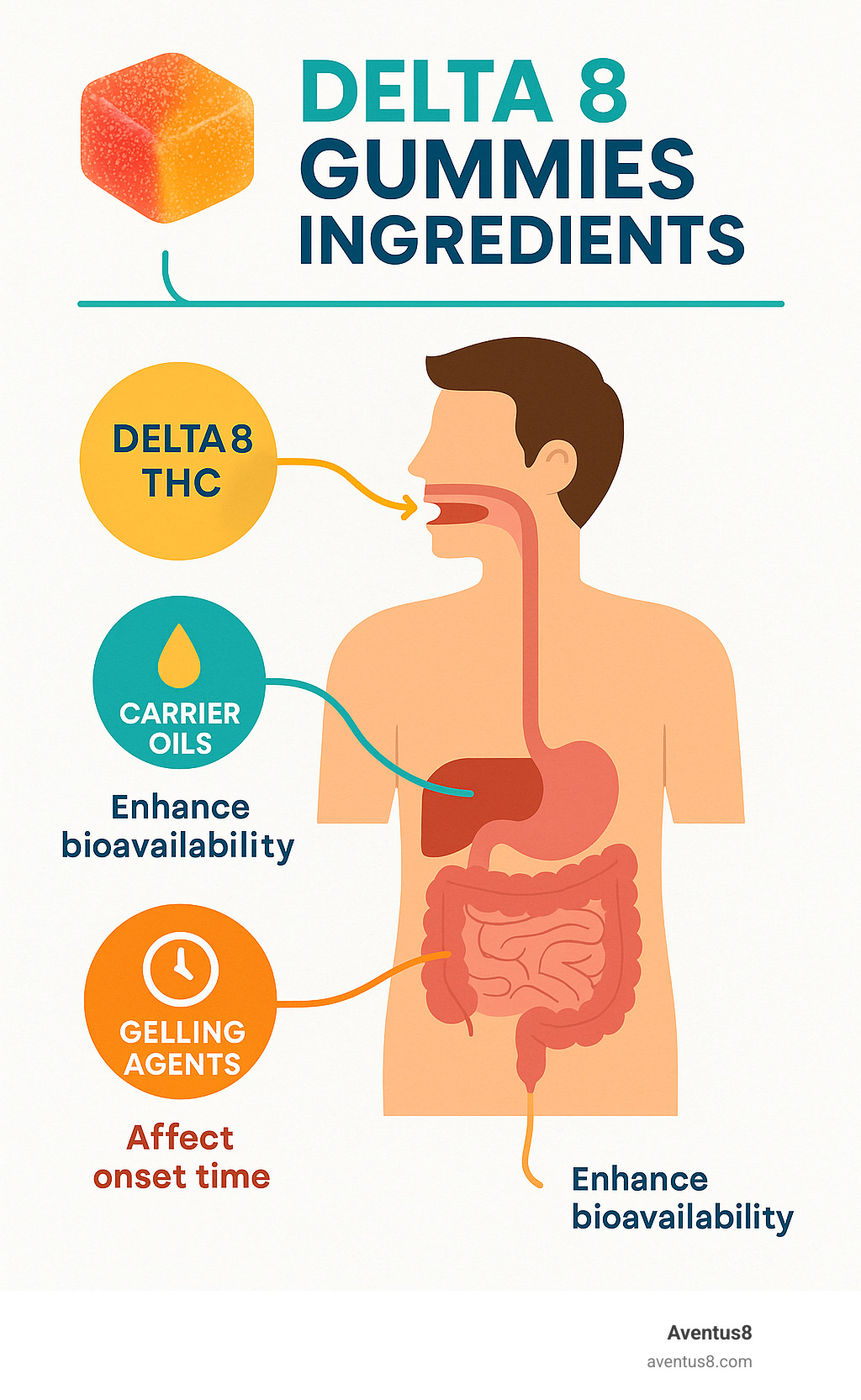
Find more about Delta 8 gummies ingredients:
Delta 8 Gummies 101: What Sets Them Apart
If you've been curious about Delta 8 gummies ingredients and what makes these hemp-derived treats different from regular CBD gummies, you're not alone. Delta 8 gummies have taken the cannabis world by storm, offering something that sits perfectly between non-psychoactive CBD and the intense high of traditional marijuana.
Think of Delta 8 THC as the "middle child" of cannabinoids. While it naturally occurs in hemp plants, you'll only find tiny traces - less than 1% in most plants. That's why manufacturers have gotten creative with chemistry to bring us these popular edibles.
The science behind the difference is fascinating. Delta 8 and Delta 9 THC are what chemists call isomers. They share the exact same chemical formula (C21H30O2), but their atoms are arranged slightly differently. It's like having identical twins who look almost the same but have completely different personalities.
This tiny molecular difference creates a much milder psychoactive experience. Research suggests Delta 8 is roughly 50% as potent as Delta 9 THC. Users often describe it as a "clear-headed high" or "weed without the weirdness" - you get the relaxation and mood boost without the anxiety or couch-lock that sometimes comes with traditional cannabis.
The legal landscape is what really sets Delta 8 apart. Thanks to the 2018 Farm Bill, hemp-derived Delta 8 products are federally legal as long as they contain less than 0.3% Delta 9 THC. This legal framework has made Delta 8 gummies accessible nationwide, though some individual states have created their own restrictions.
How Are Delta 8 Gummies Made?
Creating Delta 8 gummies is part culinary art, part chemistry lab experiment. Since hemp plants don't naturally produce enough Delta 8 to make commercial products viable, manufacturers use a process called isomerization to convert CBD into Delta 8 THC.
The conversion process requires serious expertise. Trained chemists work in controlled laboratory conditions, using food-grade acids or carefully applied heat to transform CBD molecules into Delta 8. Think of it like molecular rearranging - the same ingredients, just reorganized into a new configuration.
After conversion, the Delta 8 distillate goes through multiple purification steps to remove any leftover solvents or unwanted compounds. CO₂ extraction is considered the gold standard here because it leaves no harmful residues behind - just pure, clean Delta 8.
The purified Delta 8 then gets carefully measured and blended with carrier oils like MCT oil or coconut oil. These oils aren't just random additions to your Delta 8 gummies ingredients list - they're crucial for helping your body actually absorb the Delta 8 effectively.
The final magic happens in the kitchen. The infused oil gets mixed with traditional gummy ingredients - sugars, gelling agents like pectin, natural flavors, and colors. Quality manufacturers follow Good Manufacturing Practices (GMP) and conduct multiple rounds of testing throughout the process to ensure every gummy contains exactly what the label promises.
Comparing Delta 8 and CBD/Delta 9 Edibles
Understanding how Delta 8 stacks up against other cannabis edibles helps you choose what's right for your needs. Delta 8 gummies occupy a unique middle ground that many people find perfect for their lifestyle.
Psychoactivity levels vary dramatically between these options. CBD gummies won't get you high at all - they're purely therapeutic. Delta 9 gummies deliver a strong, sometimes overwhelming high that can last 4-12 hours. Delta 8 gummies offer a mild, manageable high that typically lasts 3-8 hours.
Dosing differences reflect these potency variations. Most people start with 10-25mg of Delta 8, compared to just 5-10mg for Delta 9 or 25-50mg for CBD. The onset time remains similar across all edibles - expect to wait 30 minutes to 2 hours before feeling effects.
Legal status creates the biggest practical difference. CBD is federally legal everywhere. Delta 9 varies wildly by state. Delta 8 sits in that federally legal gray area, though some states have specifically banned it.
Side effects tend to be much milder with Delta 8. While Delta 9 can sometimes cause anxiety or paranoia, Delta 8 users typically report only mild drowsiness and dry mouth. CBD has minimal side effects but also no psychoactive benefits.
The beauty of Delta 8 is that it bridges the gap between therapeutic and recreational use. You get genuine relaxation and mood improvement without losing your ability to function normally - making it perfect for evening wind-down or creative projects.
Delta 8 Gummies Ingredients Decoded
When you pick up a package of Delta 8 gummies ingredients, you're looking at more than just a simple candy. These colorful treats pack a carefully crafted blend of 6-12 ingredients, each playing a specific role in delivering that smooth, mildly euphoric experience you're after.
Here's something that might surprise you: the actual Delta 8 THC makes up less than 10% of each gummy's total weight. The other 90% consists of sweeteners that make them taste amazing, gelling agents that give them that perfect chewy texture, oils that help your body actually absorb the Delta 8, and natural flavors that mask any hemp taste.
Understanding what goes into your gummies isn't just about being a savvy consumer - it's about your safety and getting the most out of your experience. These ingredients determine everything from how quickly you'll feel effects to whether you might have an allergic reaction.
Common Delta 8 Gummies Ingredients List
Quality Delta 8 gummies ingredients follow a pretty standard formula, though the specific brands and sources can vary significantly between manufacturers.
The foundation starts with organic cane sugar and tapioca syrup, which provide that sweet taste and help create the signature chewy texture. Most premium gummies use fruit pectin instead of animal gelatin - this plant-based gelling agent comes from citrus peels and apple cores, making the gummies vegan-friendly while delivering better flavor clarity.
Citric acid serves double duty as both a natural preservative and flavor improver. It's what gives many gummies that subtle tartness that balances out the sweetness. You'll also find filtered water helping to dissolve and blend everything together smoothly.
The magic happens with the carrier oils. MCT oil or coconut oil aren't just random additions - they're absolutely essential for helping your body absorb the Delta 8 THC effectively. Without these oils, most of the active compounds would pass right through your system unused.
For the active compounds, you're getting Delta 8 THC distillate typically ranging from 10-50mg per gummy, plus sometimes broad spectrum hemp extract that may include other beneficial cannabinoids. Some manufacturers add natural terpenes - those aromatic compounds that can improve the overall effects.
The finishing touches include natural fruit puree for authentic flavors, natural colors from fruit and vegetable extracts, and potassium citrate to maintain the right pH balance. Everything must contain less than 0.3% Delta 9 THC to stay federally legal - a limit that's strictly monitored through third-party testing.
Vegan-Friendly Delta 8 Gummies Ingredients & Alternatives
The hemp industry has really stepped up its game when it comes to inclusive products. Most quality Delta 8 gummies ingredients now cater to vegan, gluten-free, and kosher dietary needs without sacrificing taste or effectiveness.
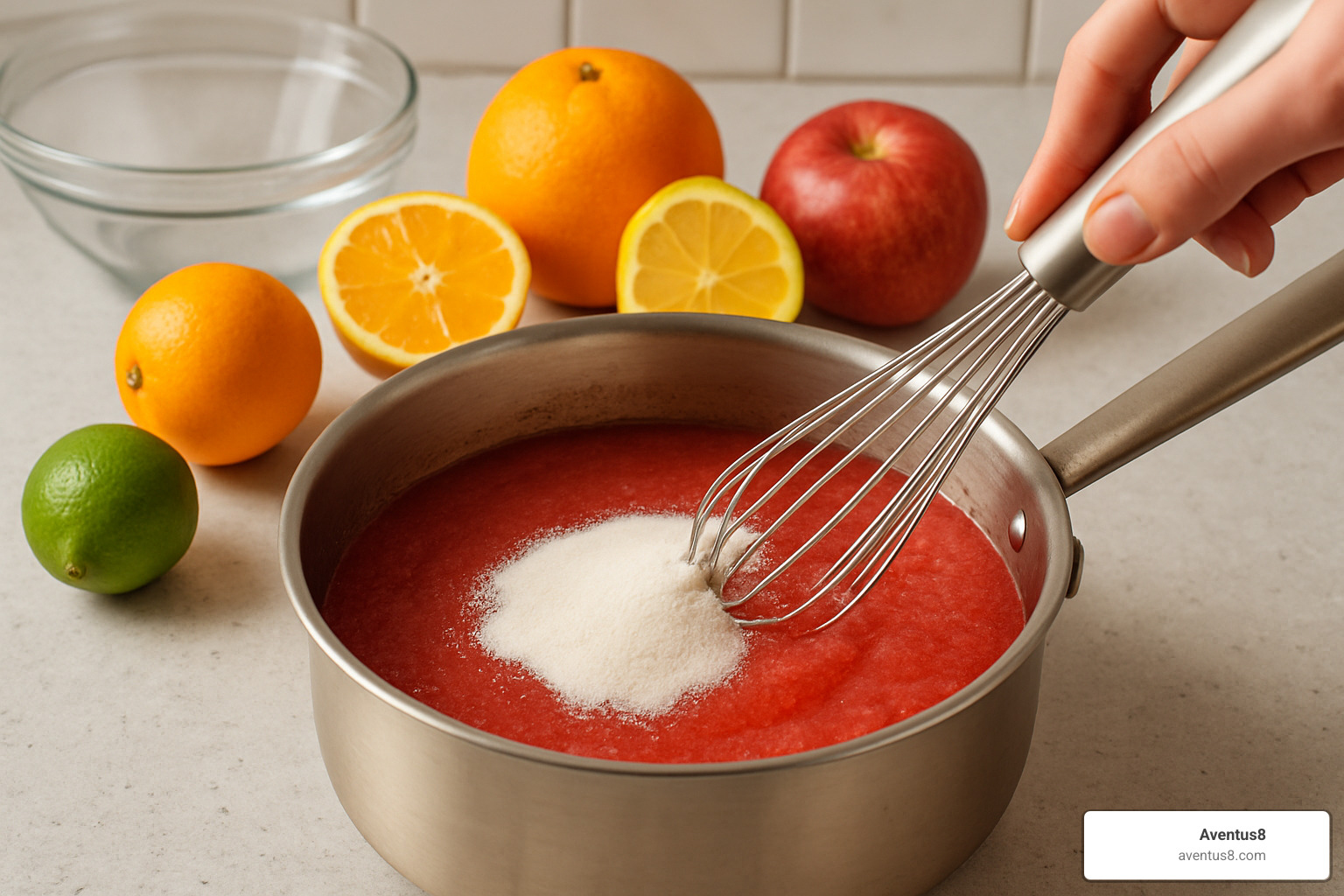
The biggest game-changer has been switching from animal gelatin to plant-based alternatives. Pectin extracted from citrus peels creates that perfect firm-but-tender texture, while agar-agar from seaweed provides excellent gelling properties. Some manufacturers use carrageenan, another seaweed extract that creates smooth, elastic gummies.
For those avoiding gluten, tapioca starch from cassava root adds chewiness without any wheat concerns. Potato starch helps bind ingredients together, while rice syrup serves as a gluten-free sweetener alternative.
Here's a fun fact: many people actually prefer pectin-based gummies over traditional gelatin ones. Pectin doesn't carry that slight aftertaste some folks notice with animal gelatin, so you get cleaner, more authentic fruit flavors.
Kosher-certified options often overlap with vegan formulations, going through additional oversight to meet strict dietary laws. It's pretty amazing how these alternatives often end up tasting better than the original recipes.
Why Carrier Oils Matter
This might be the most underappreciated aspect of Delta 8 gummies ingredients, but carrier oils literally make or break your entire experience. Without the right oils, you could be wasting most of your money on Delta 8 that your body never actually uses.
Delta 8 THC is fat-soluble, which means it dissolves in oils but not water. Think of it like trying to mix olive oil with water - they just don't play well together. Your digestive system needs those carrier oils to properly absorb and transport the Delta 8 into your bloodstream.
MCT oil has become the gold standard for good reason. These medium-chain triglycerides process much faster than regular fats, and studies show they can increase cannabinoid absorption by 2.5 to 4 times compared to no carrier oil at all. MCT oil also resists going rancid, giving your gummies a longer shelf life, and it has virtually no taste that might interfere with those delicious fruit flavors.
Coconut oil offers similar benefits since it naturally contains about 65% MCTs. It brings some additional antimicrobial properties thanks to lauric acid, plus many people prefer seeing this familiar, whole-food ingredient on their labels.
Some cheaper manufacturers use sunflower oil or other alternatives, but these typically provide much lower bioavailability. The difference can be dramatic - quality carrier oils might mean feeling the full intended effects, while poor choices could leave you wondering why your gummies seem weak.
Research highlighted by Forbes on MCT oil benefits shows these oils don't just improve cannabinoid absorption - they may also support cognitive function and provide sustained energy. It's like getting bonus benefits with your Delta 8 experience.
Safety, Potency & Compliance: Reading Labels Wisely
With the Delta 8 market growing faster than regulations can keep up, knowing how to read labels and verify quality has become your best defense against unsafe products. The FDA's report of 104 adverse events from Delta 8 products between December 2020 and February 2022 shows why this matters - and most of those reports came from edibles like gummies.
The good news? Quality manufacturers make it easy to verify what you're buying. Every legitimate Delta 8 gummy should come with a Certificate of Analysis (COA) from an independent laboratory. This isn't just a nice-to-have document - it's your proof that what's on the label matches what's actually in your gummies.
Think of a COA as your product's report card. It tells you the exact potency per gummy, confirms the Delta 9 THC stays under the legal 0.3% limit, and screens for nasty stuff like heavy metals, pesticides, and leftover chemicals from processing. The best part? Many companies now put QR codes right on their packaging that link directly to these lab reports.
If you can't find recent lab results (ideally within the last six months), that's a red flag worth paying attention to. Legitimate companies are proud of their testing and make it easily accessible.
The FDA provides an electronic Voluntary MedWatch form for reporting any problems with Delta 8 products. There's also a helpful CDC health alert that explains what to watch for and how to report issues.
How Potency Is Determined and Labeled
Understanding how Delta 8 gummies ingredients are measured and labeled takes the guesswork out of dosing. Most gummies contain between 10-50mg of Delta 8 THC per piece, with 25mg being the sweet spot that most manufacturers target.
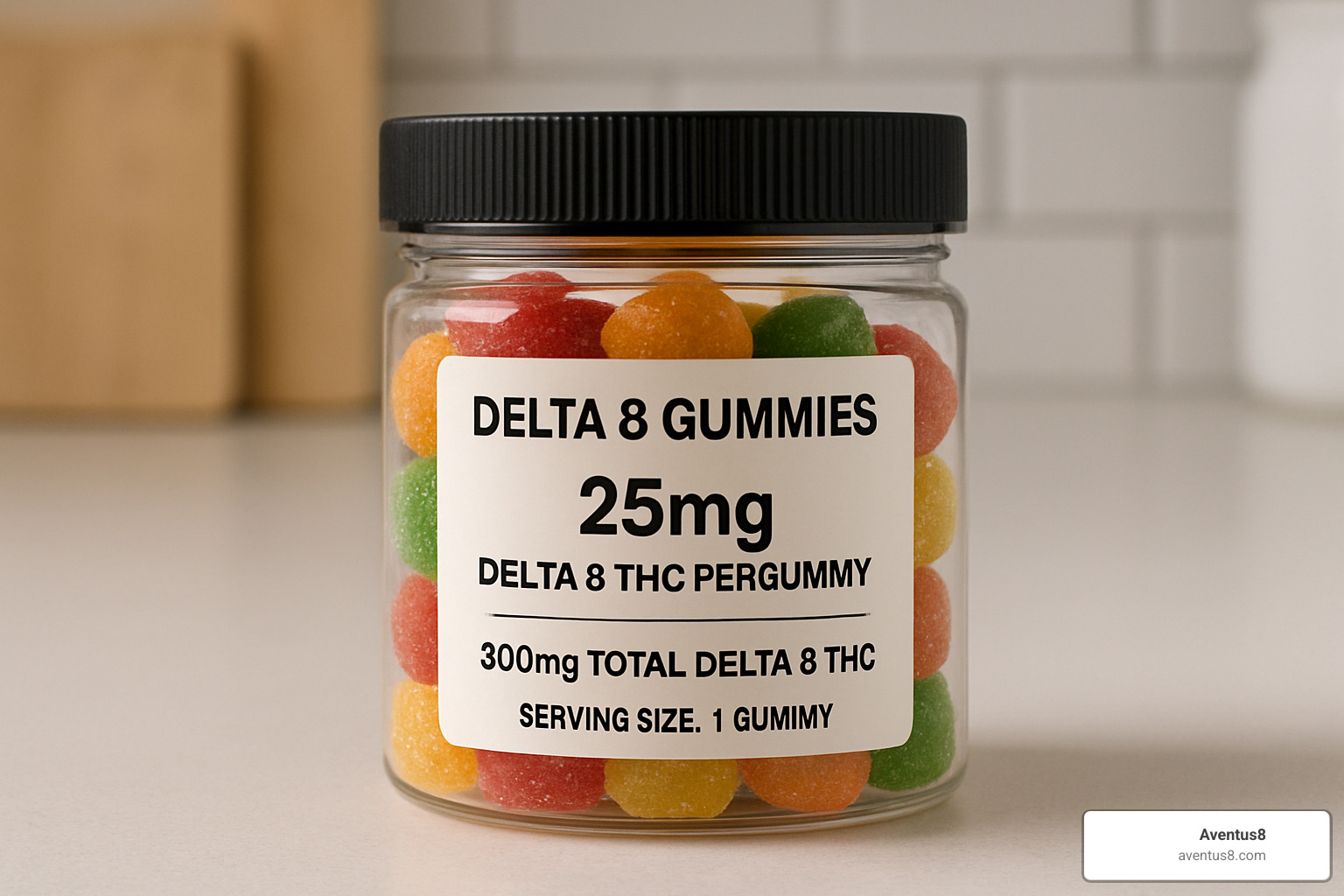
The label should clearly show mg per piece - that's your individual dose. You'll also see total mg per package, which helps you figure out how many servings you're getting and calculate the cost per mg. Smart shoppers use this to compare value between different products.
But here's where it gets tricky: serving size recommendations vary wildly between manufacturers. Some suggest a full 25mg gummy as one serving, while others recommend starting with half that amount. Your ideal dose depends on your body weight, metabolism, cannabis experience, and whether you've eaten recently.
For beginners, the golden rule is start low, go slow. Try 5-10mg (often half a standard gummy) and wait at least two hours before taking more. Delta 8 edibles have a delayed onset, and impatience leads to uncomfortable experiences more than any other factor.
Your tolerance can change based on what you've eaten, how fast your metabolism runs, and how sensitive your endocannabinoid system is. Some people feel great effects from 10mg, while others need 30mg or more. There's no shame in being a lightweight - it just means your gummies last longer!
For more detailed guidance on finding your perfect dose, check out our comprehensive potency guide.
Verifying Quality & Avoiding Red Flags
The Wild West nature of the Delta 8 market means you need to be your own quality inspector. Some warning signs are obvious, while others require a bit more detective work.
QR code scanning has become the easiest way to verify quality. Scan the code with your phone and you should immediately see current lab reports showing potency verification, solvent residuals testing, and heavy metal screening. If the code doesn't work or leads to generic information instead of specific batch results, that's concerning.
Watch out for misleading hemp-only claims. Some products market themselves as simple "hemp gummies" while actually containing psychoactive Delta 8 THC. This isn't just misleading - it suggests the company is trying to avoid proper regulatory oversight.
Synthetic additives aren't necessarily dangerous, but they often signal a manufacturer focused on cutting costs rather than quality. Premium gummies typically use natural fruit extracts and purees for flavoring, which not only taste better but indicate attention to ingredient quality.
Extremely low prices should make you pause. Quality Delta 8 gummies ingredients cost money - from the lab conversion process to third-party testing to premium carrier oils. If a deal seems too good to be true, it probably involves corners being cut somewhere in the process.
Vague ingredient lists are another red flag. You should be able to see exactly what's in your gummies, from the type of sweetener to the specific carrier oil used. Transparency in labeling usually reflects transparency in manufacturing.
For comprehensive safety information and more red flags to watch for, visit our Delta 8 safety guide.
Storage, Shelf-Life & Onset Factors
Taking care of your Delta 8 gummies ingredients after you bring them home affects both safety and potency. The oils and cannabinoids in gummies are surprisingly sensitive to environmental conditions.
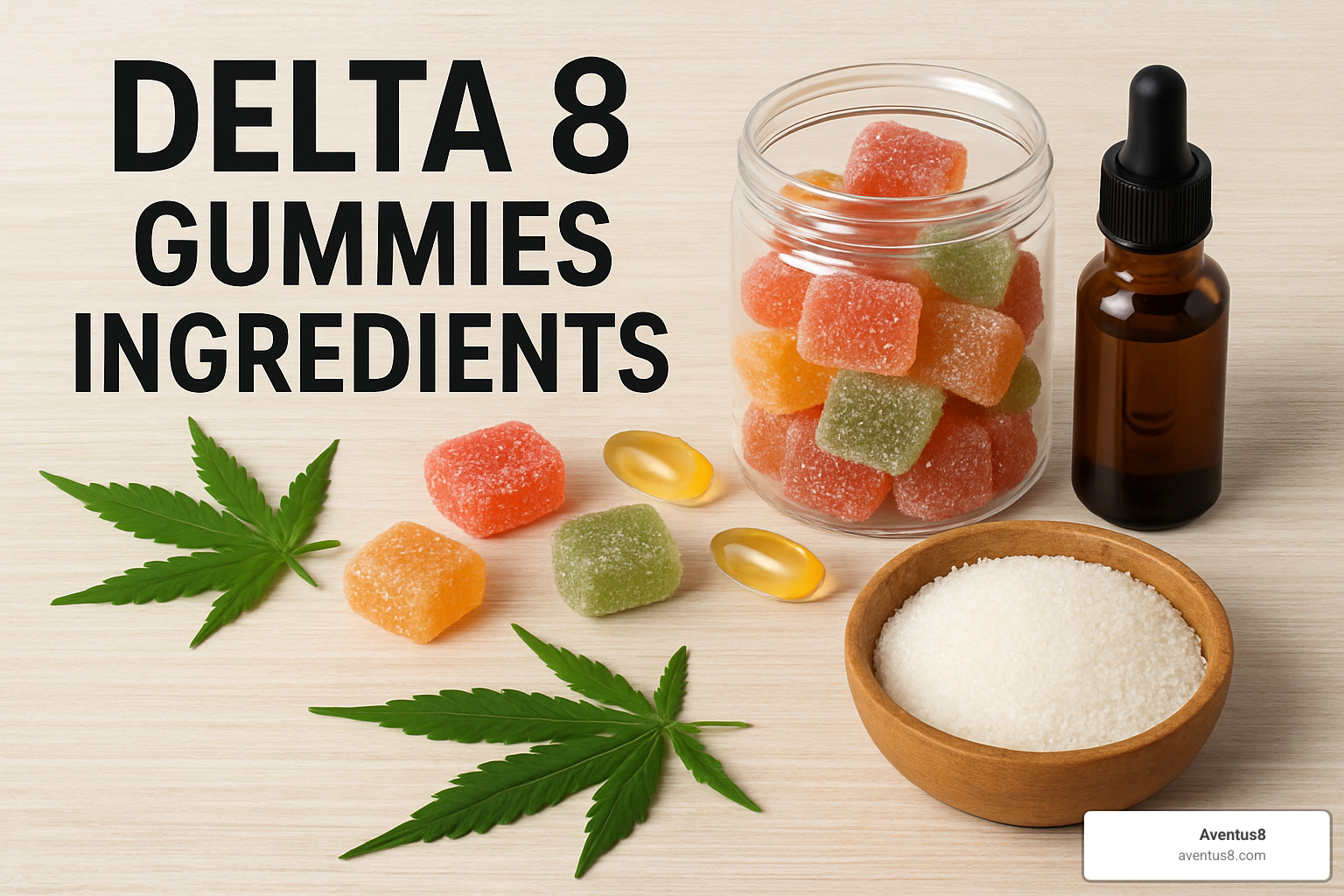
Store your gummies in a cool, dark place like a pantry or cabinet. Heat makes the oils separate and can create weird textures, while light slowly breaks down the Delta 8 over time. Airtight containers prevent moisture from making your gummies sticky or creating conditions for mold growth.
Properly stored gummies maintain 95-98% of their potency for at least four months. But leave them in a hot car or sunny windowsill, and you could lose significant strength within weeks. Fat oxidation is the main culprit - when the carrier oils go rancid, they can create off-flavors and reduce how well your body absorbs the Delta 8.
Onset timing varies more than most people expect. On an empty stomach, you might feel effects in 30-45 minutes. After a big meal, it could take 2+ hours for anything to happen. The MCT oil or other carrier oils in quality gummies help speed absorption, but your individual metabolism still plays the biggest role.
Duration typically ranges from 3-8 hours, with peak effects hitting around the 1.5-2 hour mark. Unlike smoking or vaping, edible effects build gradually and stick around much longer. Some people find that chewing their gummies thoroughly and holding them in their mouth briefly allows for some sublingual absorption, which can speed up onset slightly.
The key is patience. Moisture control in storage and understanding your personal onset factors will help you get consistent, predictable effects from your gummies every time.
Frequently Asked Questions about Delta 8 Gummies Ingredients
Let's tackle the most common questions people ask about Delta 8 gummies ingredients. These answers will help you make informed choices and avoid potential issues with your gummies.
Are Delta 8 gummies gluten-free or allergen-friendly?
The good news is that most quality Delta 8 gummies are naturally gluten-free. Since they're typically made with fruit pectin, cane sugar, and carrier oils rather than wheat-based ingredients, gluten isn't usually a concern. However, cross-contamination can happen if the manufacturing facility also processes gluten-containing products.
If you have celiac disease or severe gluten sensitivity, look for products specifically labeled as gluten-free. This means the manufacturer has taken extra steps to prevent cross-contamination during production.
Tree nut allergies are generally not a problem with coconut oil, which is technically a fruit, not a nut. Most people with tree nut allergies can safely consume coconut products. However, if you have a severe coconut allergy specifically, you'll want to look for gummies made with MCT oil from other sources.
Soy allergies might be more concerning with budget gummies that use soy-derived ingredients to cut costs. Premium brands typically avoid soy altogether. Dairy allergies are rarely an issue since most modern Delta 8 gummies use vegan formulations.
Some people experience sensitivities to artificial colors, which can cause headaches or digestive upset. If you're sensitive to food dyes, stick with gummies that use natural fruit and vegetable extracts for coloring.
Always check the full ingredient list and allergen warnings on packaging. When in doubt, contact the manufacturer directly - reputable companies are happy to provide detailed information about their facilities and ingredients.
Do artificial colors or preservatives appear in Delta 8 gummies?
This really depends on the manufacturer's priorities. Premium brands typically use natural alternatives, while budget options often include synthetic colors and preservatives to keep costs down.
Many high-quality gummies get their vibrant colors from natural fruit and vegetable extracts. Think beets for red, carrots for orange, spirulina for blue-green, and turmeric for yellow. These natural sources often provide both color and additional flavor depth.
Natural fruit purees serve double duty by adding authentic color and taste. You'll often see strawberry puree in red gummies or real blueberry extract in purple ones. These ingredients cost more but create a much more authentic flavor experience.
For preservation, most quality gummies use citric acid (from citrus fruits) and natural vitamin E as an antioxidant to prevent the carrier oils from going rancid. Some manufacturers use potassium sorbate, which is generally recognized as safe by the FDA.
FD&C artificial dyes like Red #40 or Yellow #5 are FDA-approved but some people prefer to avoid them. While these synthetic colors are considered safe for most people, they may trigger sensitivities in individuals with certain conditions.
The choice between natural and artificial ingredients often comes down to price and shelf stability. Natural colors may fade slightly over time, while artificial dyes maintain their vibrant appearance longer.
How can I check if my Delta 8 gummies meet legal limits?
Verifying legal compliance is simpler than you might think, but it requires checking the right documents. Federal law requires Delta 8 products to contain less than 0.3% Delta 9 THC by dry weight, and this limit must be verified through third-party lab testing.
Start by locating the Certificate of Analysis (COA) for your specific product. Look for QR codes on the packaging or check the manufacturer's website. The lab report should clearly show the batch number that matches your product - this ensures you're looking at results for the exact gummies you purchased.
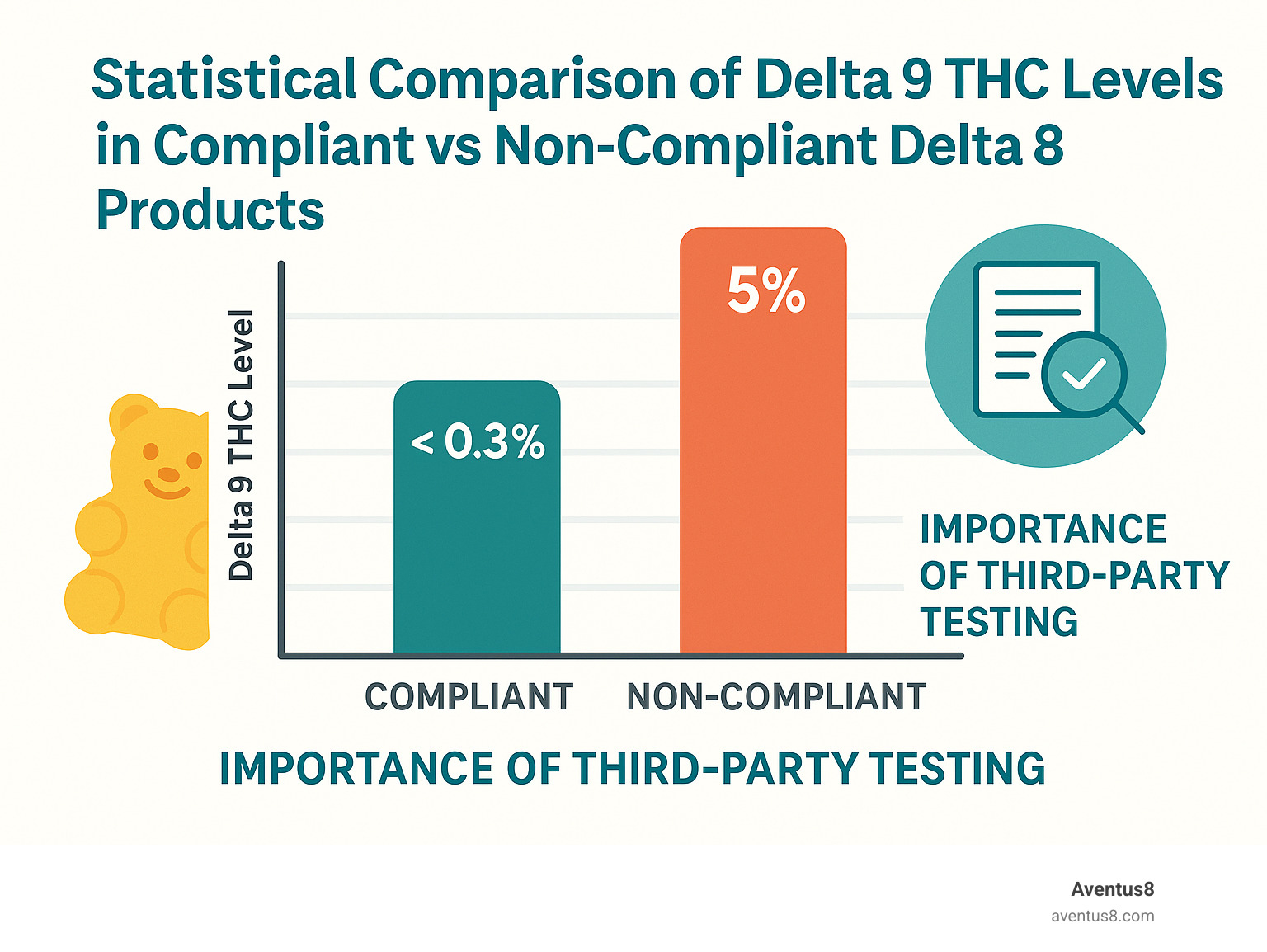
The Delta 9 THC levels should be clearly marked as less than 0.3% on the lab report. If this information is missing or the levels are higher, that's a major red flag. The testing date should also be recent - ideally within the last six months.
Here's where it gets tricky: state laws can override federal regulations. As of 2024, at least 18 states have banned or restricted Delta 8 THC despite its federal legality. States like Alaska, Arizona, Arkansas, Delaware, Idaho, Iowa, Mississippi, Montana, Nevada, and Utah have various restrictions in place.
Some states focus their restrictions on the synthetic nature of most Delta 8 products, since the cannabinoid must be converted from CBD rather than extracted directly from hemp. Others worry about marketing that might appeal to minors or inadequate safety testing.
Before purchasing or consuming Delta 8 gummies, always verify your local laws. What's legal federally might not be legal in your state, and penalties can be serious. When traveling, state laws apply wherever you are, not where you purchased the product.
The regulatory landscape changes frequently, so staying informed protects you from legal issues and ensures you're getting products that meet current safety standards.
Conclusion
After diving deep into Delta 8 gummies ingredients, you're now equipped with the knowledge to make smart choices about these increasingly popular hemp products. Every ingredient - from the MCT oil that helps your body absorb the Delta 8 to the fruit pectin that gives gummies their satisfying chew - has been carefully selected to create an effective and enjoyable experience.
The most important thing to remember is that not all Delta 8 gummies are created equal. Quality Delta 8 gummies ingredients typically include just 6-12 components, but each one matters. The carrier oils can boost absorption by up to 4 times, while proper gelling agents ensure consistent dosing in every bite. Natural flavors and colors not only taste better but often indicate a manufacturer who prioritizes quality over cutting corners.
Your safety should always come first. With the FDA reporting over 100 adverse events related to Delta 8 products, verifying third-party lab testing isn't just recommended - it's essential. Look for that QR code on the package, check that the Delta 9 THC stays under 0.3%, and never buy from companies that can't provide recent lab reports.
Starting low and going slow remains the golden rule for Delta 8 gummies. Beginning with 5-10mg gives you room to find your sweet spot without the anxiety that comes from taking too much too quickly. These edibles can take up to 2 hours to kick in, so patience is your friend.
Whether you need vegan-friendly options made with fruit pectin or you're looking for gluten-free alternatives, the modern Delta 8 market has something for almost everyone. Proper storage in a cool, dark place will keep your gummies fresh and potent for months, ensuring you get the full value from your purchase.
At Aventus8, we believe that understanding your products leads to better experiences. That's why we provide transparent lab testing, detailed ingredient lists, and the kind of customer service that actually answers your questions. We offer free shipping on orders over $75 and include a free gift to make your Delta 8 journey even better.
The world of hemp-derived cannabinoids continues to evolve, but your foundation of ingredient knowledge will serve you well. Whether you're seeking relaxation after a long day or looking for a milder alternative to traditional cannabis, Delta 8 gummies ingredients you can trust make all the difference.
Ready to experience the Aventus8 difference? Browse our carefully curated selection of premium Delta 8 gummies, all made with ingredients you can feel good about. For help choosing the perfect flavor and strength for your needs, check out our comprehensive flavor and buying guide.
Your Delta 8 journey should be both safe and enjoyable - and now you have the knowledge to make sure it is.
